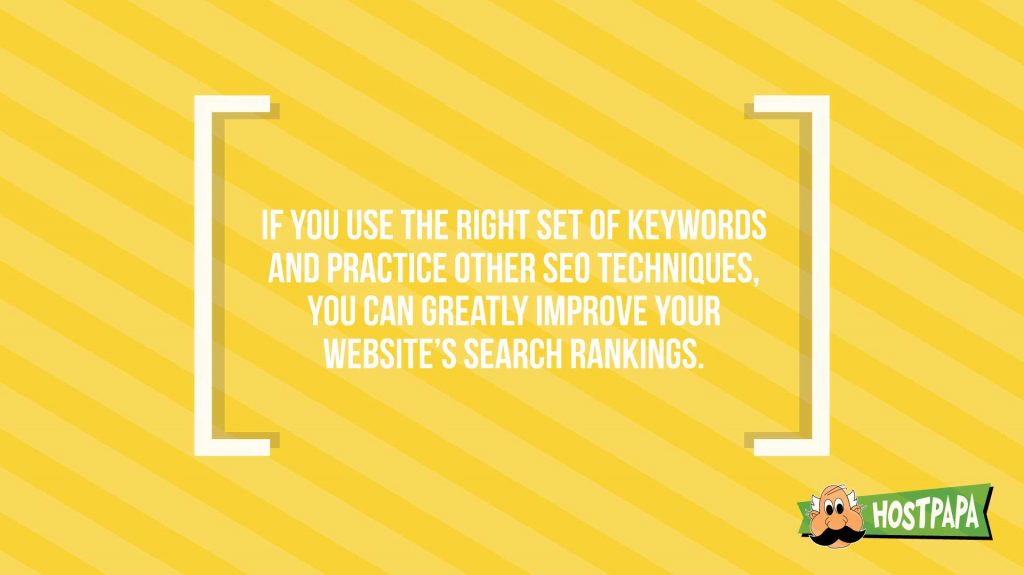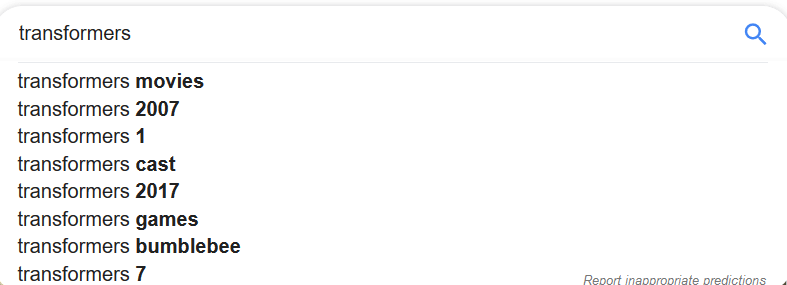Researching keywords is a vital part of SEO; the keywords you choose will be your target.
Keywords give direction to your SEO strategy. To understand what this means, you need to first understand what keywords are and how search engines utilize them.
When you use a search engine like Google, you enter a word or group of words to search. Those are keywords. You can ask a question, type in the name of something or someone you want to know more about or anything else.
The search engine takes your keywords and returns the most relevant results. One of the primary ways search engines do that is by finding web pages that contain the keywords you typed.
- What Is Keyword Research?
- Types of Keywords
- Why is Keyword Research Important?
- When Do You Need Keyword Research?
- Keyword Research Techniques
- Keyword Research Tools
- How to Find the Right SEO Keywords
- Why Target the Right Keywords?
- How to Do Free Keyword Research
- How to Do Keyword Research for Question Keywords
- Metrics to Keep In Mind When Choosing Keywords
- What to Do After Keyword Research
What Is Keyword Research?
Keyword research is one of the most common practices among online business platforms these days, and if you don’t already know about it, it’s high time you get familiar with the concept. It’s the process of understanding the lingo your target audience and customers are using when searching for products or services on the web.
The process involves searching, learning, analyzing, comparing, and prioritizing the keywords to apply them to your platform and increase traffic and opportunities for your website, blog, or store.
A “keyword” is what it sounds like, a “key” word. It’s the word or a phrase your target customers or audience type in the search box of a search engine to look for a product, content, or service they want.
Types of Keywords
Types of Keywords by Length
Keywords are classified on different bases. For instance, based on size, the keywords can be categorized into three types: short-tail, long-tail, and mid-tail keywords. And when we discuss the intent behind the keywords, they can be categorized into four types – informational, navigational, commercial, and transactional.
First, let’s talk about the kinds of keywords based on their size or length.
- Short-Tail keywords
Short-tail keywords are the most popular kind of keyword, otherwise known as generic ones. They have a very intense and high search volume of traffic. They’re usually terms of one or two words and are very competitive.
Example: yoga mats
- Mid-Tail keywords
Mid-tail keywords fall between long-tail and short-tail keywords. They have medium competition and average conversion rates. These keywords consist of two to three words and are somewhat more descriptive than short-tail generic keywords.
Example: homemade yoga mats
- Long-Tail keywords
Long-tail keywords are the longest ones. They are search terms for short sentences and are used to target a particular audience. These keywords are low-traffic, low-competition phrases and are pretty easy to rank for. Since they’re very specific, their conversion rates are higher than short-tail and mid-tail keywords.
Example: how to sew homemade yoga mats
Although keywords categorized based on length also show, at some point, what the user is trying to get, generic keywords show the user is trying to get information, and long-tail keywords show that the user is ready to take action – they’re not clear on the intent.
Types of Keywords by Intent
As stated above, four types of keywords classify the user’s intent.
- Informational
Informational keywords are intended for getting information. There are a lot of keywords with high search volumes and low conversion rates because people aren’t looking to buy anything. They’re just trying to get information.
Examples of informational keywords can be coffee calories, international coffee day, cold brew and iced coffee, etc.
The informational keyword can be detected if it’s the question keyword or just begins with “what is,” “how,” “which,” and so on.
SERPs for informational searches usually show knowledge panels, infoboxes, or excerpt answers. While not intended for purchase, these keywords can still be used in an SEO strategy to raise brand awareness and content publicity.
- Navigational
Navigational keywords are used when someone directly searches for a brand name, a company, or a physical location. It shows that the user is trying to go to a website using Google.
Examples of navigational searches can be youtube, hostpapa, nearest mcdonalds, etc.
People behind these searches are well aware of the brands and companies they’re searching for. They just use Google as a navigational tool to get to that brand. These keywords can be helpful to get organic traffic if your website or company is known.
- Commercial
Commercial keywords reveal the searcher’s interest in specific products or services.
Commercial searches occur when the user is trying to get more info about a particular product or service, with or without the idea of buying it. They may just be getting to know more about the product to compare it with a different product.
These keywords can be targeted if you’re running a promotion, advertisement, or some kind of discount or feature that can make the user more interested in your product.
Examples of such searches can be free coffee, features of ipad mini, samsung note 10 reviews, and more.
Since these keywords are searched to buy or get more information, they can be targeted to create brand awareness and valuable opportunities for sale.
- Transactional
Transactional keywords are most likely to convert the user into a customer. They have a strong intent of taking immediate action behind them. These keywords can even be targeted with paid advertisements and highly-optimized purchase pages because you know the user will take immediate action and increase your profitability.
Some examples of transactional keywords are buy shoes online, nearest pizza delivery, used car for sale, etc.
These searches usually happen when the user has already gained information about the product and is now looking for an outlet to decide. Sooner or later, that user will take action about his transactional search.
Most often, these keywords even include words like “buy,” “for sale,” “subscribe,” “selling,” and more. Consequently, the SERPs of such searches are Google shopping ads.
Another name for transactional keywords is “buyer keywords” because it’s the keyword with the highest probability of having a conversion.
And since the user has a clear intention of making a purchase, these keywords can also be particular, such as light blue iwatch step.
Why is Keyword Research Important?
If you’re a website owner, keyword research will give you valuable insights into exactly what your customers are looking for so you can provide it to them. The insights you can get through keyword research can improve your target marketing strategy.
You’re tracking what kind of solutions your target market is looking for online through keyword research. If your strategy is on point, you can provide these solutions after optimizing your content with keywords your target audience is familiar with.
This way, you’ll have a higher chance of appearing in front of your audience when they are looking for a solution outlet.
If you’re looking to do keyword research for your blogs, we have a separate article explaining this process.
Keyword research is associated with the inbound methodology, which involves creating content around what people want to discover and not what we want them to discover. In other words, we want our audience to come to us before we have to go to them.
This can be implemented with quality keyword research. A running keyword strategy can have multiple benefits for your website.
- Marketing trend insight. When you’re researching keywords, you get info about the latest marketing trends, what people are into currently, and the relevant topics of that day. You get to know what your audience wants to see.
- Traffic growth. You automatically get more traffic as you start displaying content based on what your audience wants you to display.
- Customer acquisition. As the traffic increases, conversion rates increase, and you acquire more customers.
When Do You Need Keyword Research?
When you’re trying to grow your business, you implement new strategies, enter new areas, and reach new stages. At some point, you’ll need keyword research to expand. Otherwise, you won’t be able to surpass your competitors.
Below are the three stages where you’re most likely to need keyword research.
- The SEO stage. Every website owner wants their website to rank higher on search engines. Strategies related to search engine optimization (SEO) help Google crawl our website and index it to rank organically on the search engine result pages (SERPs).
One of the most important strategies for SEO is keyword research. That’s because Google’s primary way to decide which website to rank higher is crawling websites based on relevant keywords – those that match users’ queries.
Google often changes its algorithm, but the relevance of keywords has never changed. It’s one of the most important growth factors for a website.
- Fueling your content strategy. Keyword research is critical when you’re planning on fueling your content strategy. SEO and content go hand-in-hand. Without strong content on your website, SEO is without a cause.
When you’re improving or creating content on your website, you should always do it with SEO in mind, not forgetting to include relevant keywords with high search volume and competition.
- Ad campaigns. Keyword research should never leave your mind when you’re working on the marketing aspect of your website. All of your paid campaigns, search ads, display ads, remarketing campaigns, social media campaigns, and promotions should be keyword-intense.
For instance, when you advertise with a title and description having keywords with high search volume, it’s predictable that your ad will have more traction. Similarly, if your ad doesn’t have keywords with high search volume, it may not attract many people.
Keyword Research Techniques
Different types of businesses use different techniques to research keywords. The best way to get keywords for your SEO strategy is to get a good range with different variations.
In other words, look at a keyword from all sides and angles before using it in content. Keyword research is not just about finding words with the highest search volumes. It’s about finding keywords with all essential elements, i.e. volume, user intent, and competition.
To get rich keywords, you can use six different techniques when conducting keyword research.
Bulk keyword research
Bulk keyword research is about generating as many keywords as possible for you with all the variations and combinations of different keywords.
You won’t use every keyword you’ve found in your content. When you have a long list of keywords in bulk, your next step is to refine that list by identifying keywords with high search volume and low competition. It’s essential that the tool(s) you use to research keywords also give you the alternative key phrases and the respective search volume and competition score for them.
Crowdsourcing keywords
Keyword research involves finding out what people are searching for, right? Crowdsourcing keywords is a way to discover what people are talking about. This technique helps you find amazing marketing and content ideas while also giving you keyword opportunities like never before.
Reddit is one of the platforms we recommend you use for crowdsourcing keywords, but you can go on any forum, discussion board, social media page or groups to find what people associated with your industry are talking about.
Competitor keyword research
Your competitor can be a great source of inspiration in your keyword research process. It can show you the keywords they’re ranking for, but you can also visualize the gaps and spaces in their keyword strategy.
Most importantly, it will show you the keywords responsible for bringing loads of traffic to their website. By understanding how a successful website runs in your industry, you can learn from it and strengthen your grip on already successful strategies.
Long-tail keyword research
As stated above, long-tail keywords are longer phrases with low search volume and competition. However, it also has lower keyword difficulty, which means you can excel if you specialize in this.
Fewer people are searching for what they want using long-tail keywords, but if you start implementing those keywords in your content, you can rank on top for those people. You may not become mainstream, but you can reach niche markets.
Since long-tail keywords are specific, targeting customers using them is easy – you can perfectly capture the user intent. A cluster of long-tail keywords added to an article can attract a lot of niche traffic, so it can be a good technique to use for content creation.
Keywords from SERPs
Search engine result pages are one of the best ways to discover new keywords.
Google Autocomplete (Keyword Suggestions)
If you type your main keyword in Google, it will suggest a range of different words to follow the main keyword. Google doesn’t just give these suggestions by coincidence. It’s suggesting based on what users are currently searching for.
Because of this, autocomplete is a perfect free tool to discover keywords. And it’s not just limited to Google; you can try it on Bing, Yahoo, and YouTube.
“People Also Ask” Keywords
When you search for something on Google, you see several results, but somewhere on the result page, a box says “People Also Ask.” This box, consisting of answers to more similar queries, is a great way to discover new keywords.
Even if you try ranking for one of the terms in the “People Also Ask” option, you can become relevant enough for Google to be on the SERP.
Related Searches
Related searches at the bottom of the result page are also a great source of keywords. It shows the terms people are searching for, which will give you a more detailed idea about the topic.
Trending Keywords
Apart from search volume and competition, it’s also essential to check keywords for their trends. Finding out which keywords are currently popular and which ones have grown old can significantly help your research.
Usually, when you’re using a keyword research tool, the search volume is based on the average number of searches over a period, which means you could be looking at a keyword with high volume but not decreasing popularity, or you could be looking at the one with low volume, but people are just beginning to know about it.
While many people miss this chance while making a list of keywords to use, you can get a lot of traction even on keywords that have just entered the realm and currently have low search volume and competition because those keywords will eventually get hit. You’ll be one of the first ones to reap benefits.
Keyword Research Tools
Now that we’ve covered how to find keywords, which metrics will help determine if a keyword is useful or not, and the many types of keywords, let’s look at some keyword research tools. Below is a list of tools to help you analyze the keywords you plan to use for your website.

Google Keyword Planner
Google has the most accurate information on the value of a keyword. In their Keyword Planner (which can be found inside the Google Ads tool), you’ll get information regarding how many searches a keyword gets, its price per click, and the level of bidding competition for it.
Ahrefs
This is a complete SEO tool that can analyze keywords for you. It will show you valuable information about your keywords, including a list of domains ranking for those keywords.
Semrush
The Semrush research tool shows highly detailed data about your keywords. You’ll find out how many backlinks they have, what content is ranking for those keywords, the number of searches, and more.
Google Search Console
Google Search Console is a free tool you can use to check the top one thousand keywords you’re already ranking for and the traffic you’re gaining from those keywords.
Ubersuggest
Ubersuggest is a free tool available to the public as a Google Chrome extension. It’s a powerful SEO tool that can show you the monthly search volume of a keyword, along with its cost-per-click (CPC) and competition.
Ubersuggest gives you the data on keywords for Google, along with YouTube, Amazon, and more platforms. Many other tools are just as good as these, including Moz Keyword Explorer, SECockpit, and SERPStat.

How to Find the Right SEO Keywords
The first step is to know the kind of keywords you want to (and can) rank for. After that, you should start focusing on finding the right keywords.
1: Refine Your Keyword List Using Google Keyword Planner
Google Keyword Planner is a tool you can use to get keyword search volume and traffic estimates. Flag the keywords with too much or too little traffic volume because you don’t want to get lost in the competition.
However, before you delete anything, go to Google Trends and check out the trend history projections of the keywords you have flagged. Maybe the keywords with volume might be something you can use now and enjoy the benefits later.
Either way, Google Trends will help you narrow down your research and give you an idea about which keywords are trending or have been trending in the past.
2: Prioritize the Easy Options
You don’t want to invest in something too hard to give you the perks. Instead, go for low-hanging fruit that can provide a chance for ranking on Google.
That being said, it also depends on your website’s scale. Large companies use keywords with higher search volumes, while small companies focus on low to mid-search volumes. Google will also rank you based on your website’s authority and its use of keywords.
It’s better to consider keywords with a little competition so keywords battling for higher ranks can be an accessible entryway for you.
How to Prioritize Keywords
It’s essential to know more about keyword prioritization before moving to further steps. As you choose the right keywords and analyze their metrics, ask yourself the following questions.
- What’s the traffic potential of this keyword?
- What’s the competition for it?
- Do you have content on this topic you can optimize for this keyword?
- If not, can you create such content and market it?
- Do you already rank for this keyword?
- Is this keyword likely to boost your conversion rates, or is it only increasing traffic?
While search volume, traffic potential, competition, and search intent are all important factors, the important thing is to consider if the particular keyword will add to your profitability. That’s how you can prioritize keywords.
3: Check Monthly Search Volume (MSV) for Keywords You Have Chosen
If you want to create content around what people are looking for, you should take the help of MSV.
Monthly search volume gives you the number of times a keyword has been searched in the search engine each month. Google Trends can give you that insight, or you can go to search volume.io.
4: Consider SERP features When You Choose Keywords
If used correctly, Google will highlight several SERP feature snippets. All you have to do is look for a keyword you have chosen and check out the first few results.
To summarize, there are a few SERP feature snippers.
- Image packs are search results displayed as horizontally aligned images on the very top of the SERP. To appear in the image pack, it’s important to create image-heavy content with keyword-rich alternate texts.
- Paragraph snippets are short text snippets that appear at the top of the search page that directly answer the user’s query. It is vital to understand the search intent and write content just around it.
- List snippets listicles are list-formed information appearing at the top of the SERP. It consists of steps or just a common list of items answering the search query. Usually, “how-to” or “types of” articles win this placement.
- Video snippets are videos that Google displays at the top of the SERP. You can win this place if you have included the video in an article with rich keywords or if you have a video on YouTube with targeted keywords in the title and description.
5: Keep Some Generic and Long-Tail Keywords in the List
While it’s critical to have short-tail keywords to aim for the competition, long-tail phrases balance out your SEO strategy. With such a strategy, your goals become realistic and balanced.
Now, it’s very important to make sure that a long-tail keyword and a generic one are co-dependent and are equally relevant to your website.
For example, blogging and how to write a blog.
In this example, blogging is much harder to rank than the former. While the first term has the greater potential of sending you the traffic, it’s more realistic to expect the traffic from the second term. And honestly, traffic from the long-tail keywords is usually more desirable.
Why? Someone searching exactly for what they want – how to write a blog – and not just something generic – blogging – is a more qualified researcher and is more likely to actually buy your product or service. Someone searching for blogging may just be searching for something totally unrelated to your business.
Therefore, keep a healthy mix of both. While long-tail keywords will get you quick wins, short-tail ones will help you make your place in the long term.
6: Check Your Competitors for the Keywords You Have Chosen
This step requires some effort to analyze your competition. The first thing to know here is that you don’t have to do something just because your competitor is doing it. A keyword important to your competitor might not be as important for your business.
Instead, you should understand what your competitor is ranking for so you can evaluate your own position to try to fill the gaps your competitor is leaving. While you should improve the keywords your competitor is using, you should also focus on the ones they’re not using so you can get your market share based on those keywords.
But how will you know what keywords your competitors are ranking for?
Well, aside from manually looking at the competitor’s website and taking notes, Ahrefs allows you to run a number of free reports that can give you insights on top keywords if you enter the domain of your competitor. This way, you can quickly learn about the top keywords your competitor is using to get rankings.
Why Target the Right Keywords?
Now that you understand what keywords are and how search engines use them, let’s look into the benefits of finding the right keywords for your website.
If you use a specific set of keywords and practice other SEO techniques, like backlinking, you can greatly improve your website’s ranking in search results. That leads to:
- An increase in high-quality traffic on your website
- Exposure to your target audience without paying for ads
- The ability to improve your brand image
There are people looking for the products or services you sell on your website. If your site is optimized with the right keywords, all those people will find you. That can be extremely beneficial for your business – your target audience will visit your website, leading to new customers.
But to achieve this, you need to find the right keywords, and that requires keyword research.
How to Do Free Keyword Research
Keyword research, first and foremost, is about knowing how to pick the right keywords. In this section, we’ll show you how to choose the perfect keywords for SEO.
1: Choose Long-Tail Keywords
We’ve already talked about how the length of your keywords can have a big impact on the success of your SEO strategy.
For example, the keyword “Playstation 4” is a short tail keyword. As such, it’s highly competitive. Here are the results you get when you type ‘Playstation 4’ into Google.

The websites that show up are very high authority and very popular, getting millions of visitors per month. Since your website is receiving nowhere near as much traffic and popularity, there’s almost no chance that you’ll be able to rank your site for a keyword like that.
Instead, consider a keyword like ‘best playstation 4 split-screen co-op games’. This is a long-tail keyword with a lot less competition. You can target these keywords easily because the domains that rank for them have little authority, and that can make it easier for you to take their spot.
2: Keyword Search Intent
When you’re targeting a keyword, make sure the intent behind it is clear.
Suppose you run a travel blog that focuses on popular locations within the U.S. You review destinations like Yosemite, the Grand Canyon, and the Statue of Liberty. In that case, you might want to target keywords like “hidden places in the Grand Canyon to visit.” This keyword has serious intent behind it, meaning the person typing it is probably planning to visit the Grand Canyon.
On the other hand, for a travel blog, a keyword like “pictures of Grand Canyon” does not have a lot of intent behind it. This person might be just casually checking out what the place looks like. With a keyword like that, there’s a smaller chance that a travel blog would attract the target audience it’s after.
If you were selling an ebook about the wonders of the Grand Canyon, that same keyword, “pictures of Grand Canyon,” might be just what you should target. The user who types this keyword clearly wants to learn more about the Grand Canyon, and your e-book might be exactly what they’re looking for.
The point is that you should consider the intent behind the keywords you target. It will vary depending on what you’re promoting, so you have to think of the audience you want to attract to your website.

3: Use the Same Keywords as Your Audience
If you hit a wall when thinking of keywords, all it takes is some inspiration to get back on track. You can get content ideas that will lead you to great new keywords.
The internet is full of sites that have fresh and trending conversations. These sites reflect what people are talking about right now, and the words used in their conversations can be great keywords for your site.
Here are three places you should check out to get keyword ideas:
Reddit is one of the best places on the internet to find content ideas. It’s a platform where people from all over the world come together to talk about anything that interests them.
There are groups, known as subreddits, for literally every topic of the world, from running shoes to the stock market and from TV and movies to the Bermuda Triangle. For example, if you want to read discussions on SEO, head to the r/SEO subreddit to see the latest threads on that topic.

If you’re promoting SEO services, then within this subreddit, you could find some very interesting content ideas that will yield new keywords.
Udemy
If you want some excellent keywords to target, there’s no better place to look for them than Udemy. Here, you can find courses on any topic imaginable. For example, if you want to target an audience that might buy your SEO course, you need to rank for keywords that are relevant to that subject, and you can use Udemy to find such keywords.

Each part of this table of contents could be used as a source of new keywords to target. Because the keywords are from a high-authority site like Udemy, you can expect them to attract the right kind of traffic, in this case, an audience that’s interested in buying your SEO course.
Quora
Another great place to find high-quality keywords is Quora. Here people ask questions every day, and incredibly in-depth answers are posted in response. This makes Quora a goldmine of relevant content ideas and keywords you can use for SEO.
Just type in the product, service, or topic that you want to find keywords for, and you’ll be presented with a list of thoughtful questions on the subject.
For example, searching for ”software-as-a-service” brings up these questions:

After you open a question, you’re presented with a list of related questions on the right.

Any of these questions can act as relevant long-tail keywords that you can use on your website.
4: Use LSI Keywords
LSI keywords are keywords that help Google and other search engines understand the context behind a query.
LSI stands for latent semantic indexing, a mathematical approach to detecting how word groupings can indicate context. Don’t let the nerdy terminology scare you off. LSI keywords are simply words that are topically related to your main keyword and are often found close to it.
When you type in ‘transformers,’ how does Google know whether you’re talking about the movie or the electrical device?
If you added “movie” as a keyword, the context would be clear. Google will scan web pages for LSI keywords related to your main keyword. Extending our example, some LSI keywords related to “Transformers movie” would be “Michael Bay,” “Autobots,” and “‘Release Date.”
Using LSI keywords with your main keyword will help search engines factor in the context of the query and return the most relevant results – results in which your site could be extremely visible.
There are good ideas available in autocomplete to find LSI keywords.

Or, you can use sites like LSIGraph and LSIKeywords to find relevant keywords to use with your main keyword.
How to Do Keyword Research for Question Keywords
Your audience probably has lots of questions they’re searching for on the internet. The easy and amazing way to build your website’s trust and increase your traffic is to provide great answers to these questions.
If you target questions, you’re showing your audience that you care about their problems, and you are choosing to be a part of the solution, which will help them discover you and engage with your business.
Question keywords can also help you organically. If you give high-quality answers to questions, your credibility and digital traffic will increase. As a result, you’ll automatically begin to rank higher on SERPs.
All you have to do is figure out the questions you can answer in the best manner.
Luckily, there’s a free tool for that. Answer the Public allows you to see the questions people are searching for on the internet based on the keyword. The tool groups the questions into where, which, who, how, and why categories.
Once you type in the keyword, you’ll be presented with a circular image of questions centred around the particular keyword.
For example, if you search for running shoes, you’ll see questions such as “Where to buy running shoes?” and “Who sells the best running shoes.” The questions can also be directed towards technicality, such as “what type of running shoes to give to an old person.”
Next, you can choose questions and check out the search volume for the questions through one of the keyword research tools.
Metrics to Keep in Mind When Choosing Keywords
There are a lot of measurable factors you should take into consideration when choosing keywords. This section covers the top three.
Searches Per Month
If a few people use a keyword to search for something, that keyword has very little value. Your website won’t ever be returned in search results if you use keywords no one is searching for.
Keyword Competition
Type in a keyword you plan to use for SEO. If you see a lot of ads for that keyword, you know it has a lot of competition.
In addition, you can analyze your competitor’s websites with keyword research tools, find the top keywords they’re ranking for, and use those keywords for yourself.
Strength of the Top Domain
The more competition a keyword has, the harder it will be to rank for that keyword. So, before you use a keyword, type it into Google and see what kind of domains are ranking for it.
We touched on this topic earlier. Basically, you shouldn’t go for a keyword that has high-authority domains like Wikipedia and Amazon ranking for it. Look for keywords that lesser-known websites rank for – it will be easier to overtake those sites in search rankings for your niche.

What to Do After Keyword Research
Once you’re finished with keyword research, you’ll need to incorporate your keywords into your website. Here are five great places where you can do that:
- Inside your content: Your content, i.e., blog posts, web pages, and videos, is a great place to add your keywords.
- In backlinks: When you write a guest post for someone else’s blog or when someone links to your content, the anchor text can include the keywords you choose.
- In your URLs and meta tags: The URLs and meta tags for your blog posts and other web pages are great places to incorporate keywords.
- Your homepage: Your website’s homepage is an ideal location to add the keywords that you’re competing hardest for.
- Alt-text of images and videos: Your website probably has images and videos published. You can add your keywords to the alt-text of those media files.
By adding your keywords to these places, you’ll significantly increase your chances of ranking for them.
Are you sure you are targeting the right keywords? Check out HostPapa’s web hosting services for your website today!




